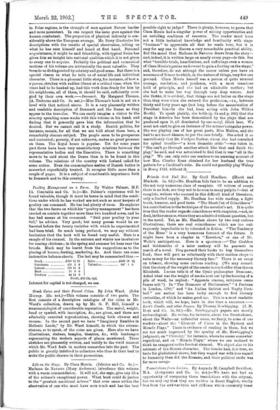Life on the Stage. By Clara Morris. (Isbister and Co.
6s.)— Madame de Navarro (Mary Anderson) introduces this volume with a warm commendation. It will not, she says, give any idea of the actress's exceptional power. What book could do justice to the " greatest emotional actress" that ever came within the observation of one who must have seen much and has the best possible right to judge ? There is plenty, however, to prove that Clara Morris had a singular power of seizing opportunities and an unfailing readiness of resource. The reader must have not a little technical knowledge and familiarity with stage "business" to appreciate all that he reads here, but it is easy for any one to discern a very remarkable practical ability. But the moral that Madame de Navarro draws from the story— and, indeed, it is written large on nearly every page—is this. See what "terrible trials, humiliations, and sufferings even a woman of Clara Morris's genius underwent to gain a footing on the stage," and, therefore, do not attempt the career unless you have an assurance of fitness to which, in the nature of things, very few can pretend. Clara Morris herself was a person of quite unusual courage, resolution, and prudence, with a most tenacious hold of principle, and she had an admirable mother; but she had to make her way through very deep waters. And she thinks, it is evident, that things are not better on the stage than they were when she entered the profession, i.e., between thirty and forty years ago (not long before the assassination of President Lincoln she had been acting with John Wilkes Booth). To speak plainly, she holds (p. 31. and p. 389) that the stage in America has been demoralised by the plays that are produced upon it, all dominated by one motif, illicit love. We must not omit to give an instance of the actress's singular power. She was playing one of her great parts, Miss Multon, and she had to act heart disease, to put the case briefly. She acted it so marvellously that Dr. Fordyce Barker, whom she had consulted for spinal trouble—" a keen dramatic critic "—was taken in. " She can't go through another attack like that and finish the play," he said, and was astonished to find that it was "all in the play." We can only refer our readers to an amusing account of how Mrs. Charles Kean obtained for her husband the true pattern for a Cardinal's robe. He could not possibly play Wolsey in Henry VIII. without it.










































 Previous page
Previous page